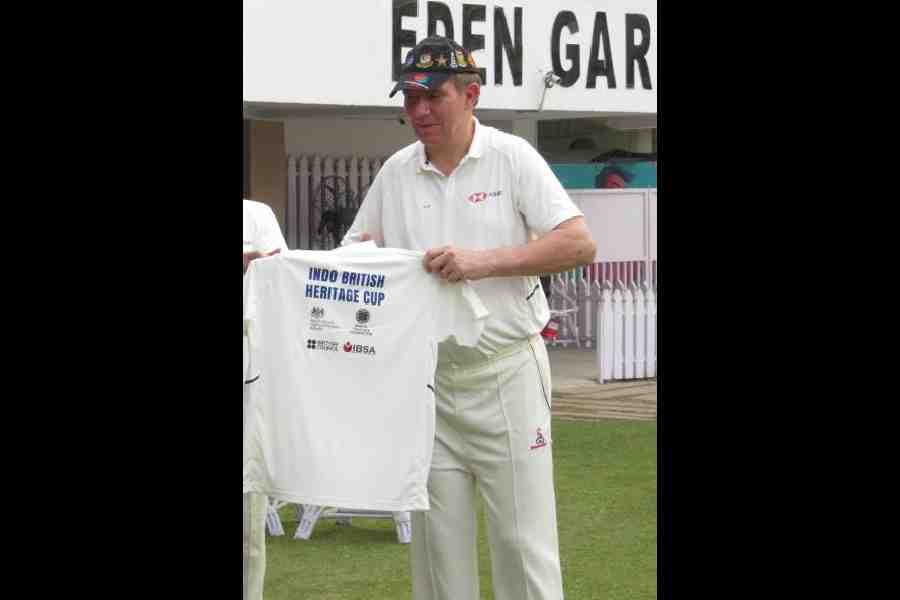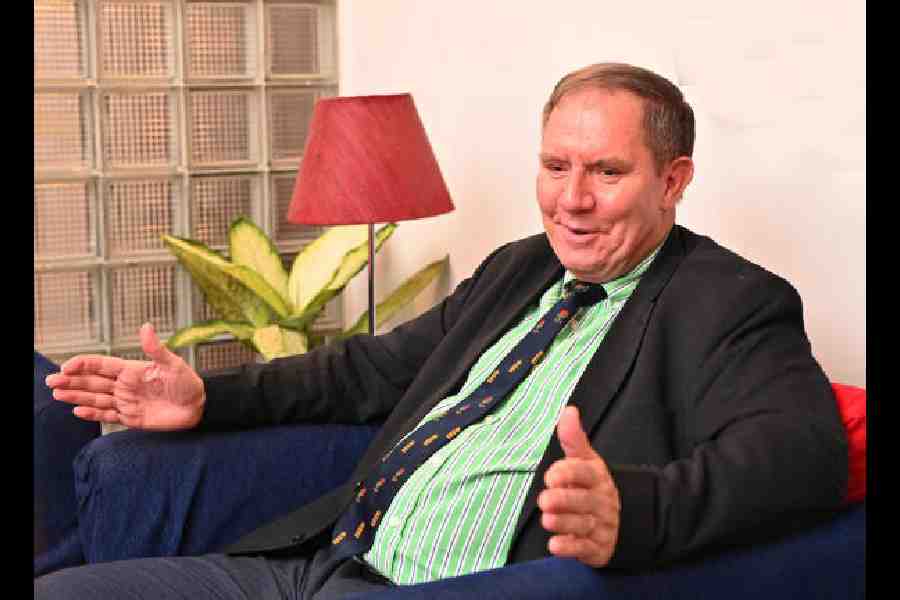Nick Low, the British deputy high commissioner, ended his tenure in Calcutta in September. He shares with t2 the cheers and challenges of his four-year stay.
You posted pictures on social media of soft toys being cleaned before being shipped back.
We were blessed with the world’s best dhobi. Everything came back beautifully pressed and folded. In four years, he has not damaged a single item of clothing! My wife, being Brazilian, is scrupulous about cleanliness and order. She said she wished she could take him back home.
What else do you wish you could take back home?
I want to take my home! The surface area here is a little over 3,000sqft. Going back home to 1,100sqft poses a challenge. Things would simply not fit. Last week, I got out all the books and mementoes I could not take back and invited the team over to pick up whatever they pleased. Everyone went back with a good armful.
Which have been your favourite haunts?
I could be out 11 nights a week if I wanted! That is the volume of invitations we get. It is not uncommon to have three or even four invitations on the same night. Some diplomats have soup at one place, the main course at another place and dessert elsewhere. I am not a fan of doing that.
If you had the weekend to yourself, where would you go?
Oh my god, that never happens! Till two months ago, I had two school-aged children. They are in boarding school now. Whenever they are here, I ask them what they want to do. (Son) Rafael likes to play golf at Tollygunge Club. (Daughter) Mari(ana) likes swimming. I like to spend time at home. I love entertaining at home and being entertained at people’s home. My house is like a gallery. We have eight display cabinets and two more in the landings. Every wall has pictures. Or I’d go to Fire and Ice, or The Glenburn Café or Peter Hu?.
Where all have you travelled to in India?
I have been to nine states and the Andaman and Nicobar Islands. If you count my previous visits to India when I was the deputy high commissioner in Dhaka, I have been to 20 of the 28 states in India. My favourite museum is the Bihar Museum in Patna, which I think is extraordinary. Many of their treasures are in fabulous condition despite their antiquity. It is a proper 21st century museum. My Masters is in ancient history and I love sculptures. I also loved the little museum in Aizawl. There is a great museum in Shillong with a fabulous view from the roof. Ditto for the Agartala (Tripura State) museum that gave me a proper immersion in the richness of the ethnic mosaic that is Northeast India.

Nick Low at the Eden Gardens for an exhibition match in January 2020 Picture by Sudeshna Banerjee
What other places did you enjoy visiting?
I loved my trip to Khunti in Jharkhand where we visited a tribal community. There was a view that made me feel that this is the India of my dreams — wonderful greens, water buffaloes, rice growing, sound of birds singing…. In Odisha, I loved the Sun Temple at Konark and the beach at Puri. In West Bengal, I love the Sunderbans. There’s a timeless, otherworldly quality about it. I didn’t see a tiger but virtually no one does. If you want a break from the rough and tumble, you should go down there. I have been there twice. People say Darjeeling has been spoilt by too many tourists. But I liked Darjeeling. Despite the bitter cold, watching the sunrise in the Tiger Hills was gorgeous. As for the world’s wettest place, Meghalaya, I have walked over the root bridge there. Kohima is a beautiful city. The war cemetery there combines a great sense of peace, tranquillity and dignity. To be able to lay a wreath there on November 11, Armistice Day, was a special moment.
You have played an exhibition match at Eden Gardens.
I have seen Test, IPL and T20 matches at Eden Gardens. And yes, I have played there too. And I got to watch a dream final at Durand Cup between East Bengal and Mohun Bagan at — I am going to go for this — Vivekananda Yuba Bharati Krirangan.
You got that right!
(Smiles) This was just like in China where I had not been to a Chinese Super League match till my last month in Beijing. We also watched the (FIH Men’s) Hockey World Cup in Bhubaneswar.
Which sporting experience do you cherish most?
I know India has created this behemoth cricket stadium at Ahmedabad. But it’s not just about size. Being special comes from heritage. For me, one of the three big cathedrals of the game is Eden Gardens and will be for another hundred years. There was a survey among Indian cricket personalities about their favourite grounds and the only ground that all of them had named was Eden.
A part of your tenure was clouded by Covid.
Our team bonded during those dark times and we possibly did the most logistically complex evacuation anywhere in the planet. I know Goa had more numbers but all they had to do was transport busloads from beachfront hotels to the airport. In Punjab and Gujarat, there were greater numbers but people were staying with family. Here too some were Bengalis who had come back for the winter. But a number of people in the Northeast were on their own and some were very old. The state boundaries were closed. Of the people we put on that flight on April 17, 24 were in wheelchairs. We had teachers, missionaries, NGO workers — from across East and Northeast India, often in isolated communities. Most needed to cross two or three state boundary lines, and in one case, seven. To sum up, 4,000km on the road, 120 drivers, 80 vehicles, 160 people evacuated by one team.
That must have been a Herculean task!
Yes. That quote was used by the head of the diplomatic service, giving evidence to the House of Commons foreign affairs committee to demonstrate how technically complex it was. As a result, out of all the posts in the world, we were chosen to have a live video interview with the late Majesty the Queen. I chose one of my Indian colleagues to do that, a polyglot speaking six languages who got us out of a hole every time we had a driver calling to say he had been stopped at a state boundary. There was one period of three days when virtually none of us went to bed. It was at night when people were mostly getting stopped on the road. I needed to be there so I could speak to chief ministers and police chiefs. The Daily Mail and the Mail on Sunday, newspapers which historically do not report favourably on the foreign office, wrote a positive story each on what we had done.
Coming back to your stay in Calcutta, are you taking back recipes for any Bengali dishes?
We had a profound immersion into Bengali cuisine during my four years in Bangladesh. Do not tell this to my friends across the border but the experience here has been better. There they went into this default decision: “White man won’t like spicy food.” And I was served so many insipid curries! It was done out of kindness, of course. The best meal I had in Bangladesh was at the air force base in Chittagong where I had gone for a passing-out parade. It had overrun and it was dark when we got to the air force base to take a helicopter back. I was taken to the officers’ mess for a meal. It was a really strong curry that bit back, just as I’d have it back home in the UK. But they thought it would make me sick! People did not realise that there, but here they do. Those who know the UK say: “We don’t like what you call Indian food in the UK but, of course, you do. It is carpet-bombing with chilli pepper to the extent that you can’t taste anything else.” I say: “But what’s wrong with that!” That is what I grew up on, in the London borough of Tower Hamlets. It is said to be the largest Bangladeshi city outside Dhaka — Bangladesh by the Thames.
Did you pick up any Bengali?
It has been rare when I felt compelled to. Out of 100, 99 people I met understood me in English. It has not been so in many places I have been to. Brazil would have been hopeless without Portuguese, Santiago without Spanish, Algiers without French or Arabic.... And learning Bengali would have taken a nine-month course.
Any farewell message?
As I have said in my speeches, Calcutta is the cultural, culinary, intellectual, literary and sports capital of India. I mean it.
